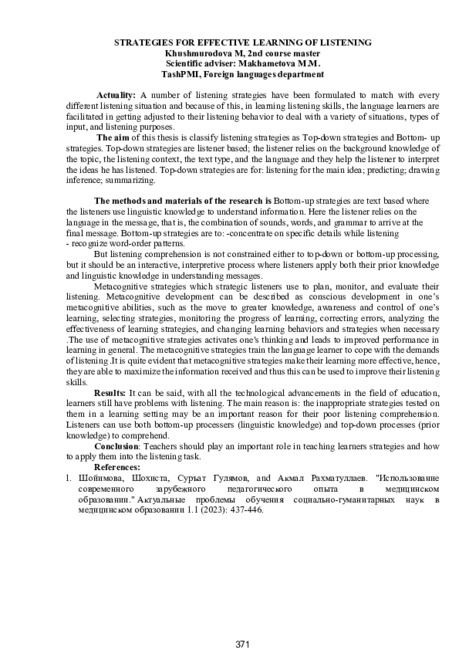
371
STRATEGIES FOR EFFECTIVE LEARNING OF LISTENING
Khushmurodova M, 2nd course master
Scientific adviser: Makhametova M.M.
TashPMI, Foreign languages department
Actuality:
A number of listening strategies have been formulated to match with every
different listening situation and because of this, in learning listening skills, the language learners are
facilitated in getting adjusted to their listening behavior to deal with a variety of situations, types of
input, and listening purposes.
The aim
of this thesis is classify listening strategies as Top-down strategies and Bottom- up
strategies. Top-down strategies are listener based; the listener relies on the background knowledge of
the topic, the listening context, the text type, and the language and they help the listener to interpret
the ideas he has listened. Top-down strategies are for: listening for the main idea; predicting; drawing
inference; summarizing.
The methods and materials of the research is
Bottom-up strategies are text based where
the listeners use linguistic knowledge to understand information. Here the listener relies on the
language in the message, that is, the combination of sounds, words, and grammar to arrive at the
final message. Bottom-up strategies are to: -concentrate on specific details while listening
- recognize word-order patterns.
But listening comprehension is not constrained either to top-down or bottom-up processing,
but it should be an interactive, interpretive process where listeners apply both their prior knowledge
and linguistic knowledge in understanding messages.
Metacognitive strategies which strategic listeners use to plan, monitor, and evaluate their
listening. Metacognitive development can be described as conscious development in one’s
metacognitive abilities, such as the move to greater knowledge, awareness and control of one’s
learning, selecting strategies, monitoring the progress of learning, correcting errors, analyzing the
effectiveness of learning strategies, and changing learning behaviors and strategies when necessary
.The use of metacognitive strategies activates one's thinking and leads to improved performance in
learning in general. The metacognitive strategies train the language learner to cope with the demands
of listening .It is quite evident that metacognitive strategies make their learning more effective, hence,
they are able to maximize the information received and thus this can be used to improve their listening
skills.
Results:
It can be said, with all the technological advancements in the field of education,
learners still have problems with listening. The main reason is: the inappropriate strategies tested on
them in a learning setting may be an important reason for their poor listening comprehension.
Listeners can use both bottom-up processers (linguistic knowledge) and top-down processes (prior
knowledge) to comprehend.
Conclusion
: Teachers should play an important role in teaching learners strategies and how
to apply them into the listening task.
References:
1.
Шойимова, Шохиста, Суръат Гулямов, and Акмал Рахматуллаев. "Использование
современного
зарубежного
педагогического
опыта
в
медицинском
образовании." Актуальные проблемы обучения социально-гуманитарных наук в
медицинском образовании 1.1 (2023): 437-446.






